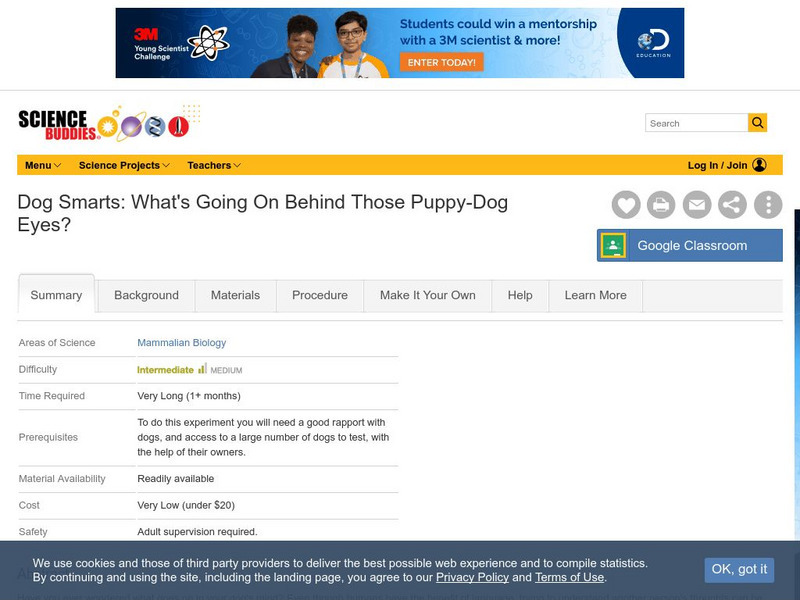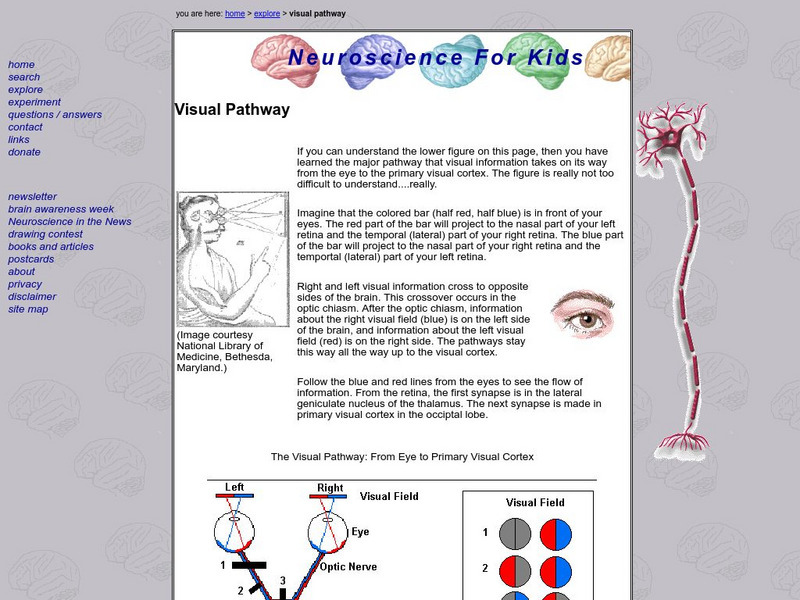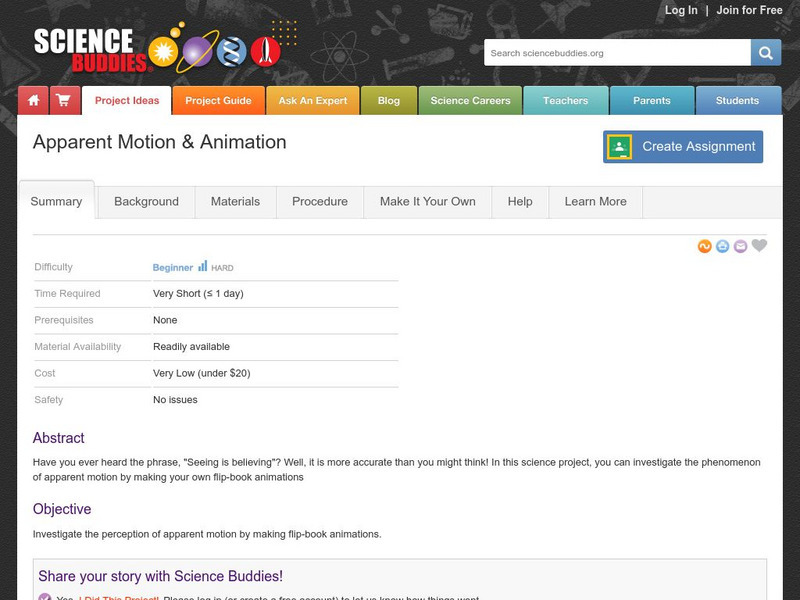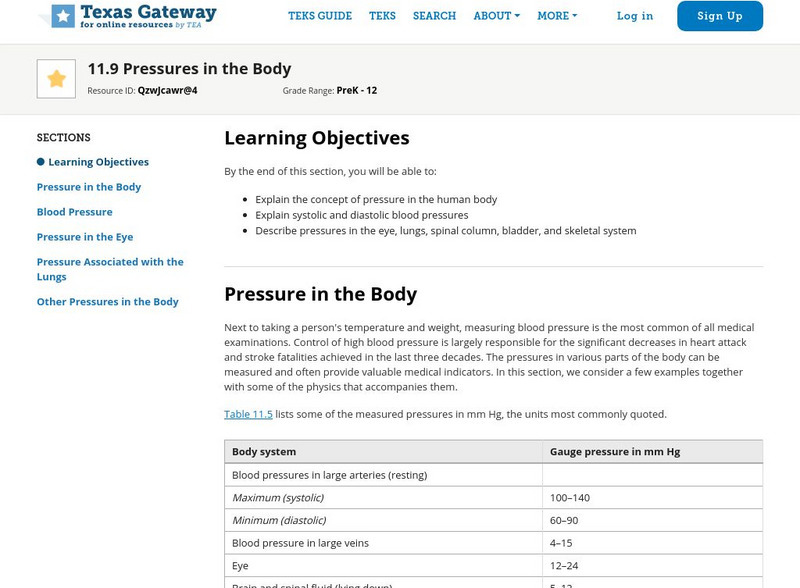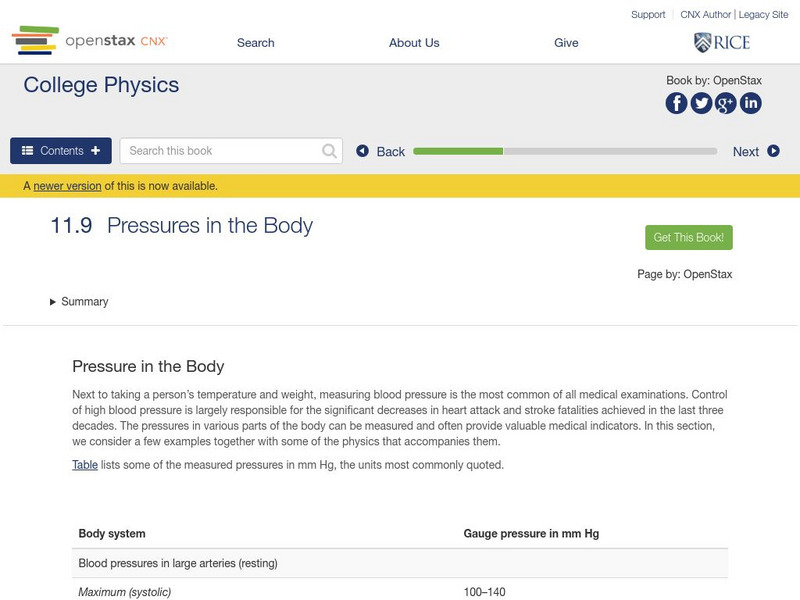Science Buddies
Science Buddies: Do the Eyes Have It?
Some people have a photographic memory and can memorize anything they see almost instantly. Other people can remember almost anything they hear. Try this experiment to see which type of memory you have.
Science Buddies
Science Buddies: Dog Smarts: What's Going on Behind Those Puppy Dog Eyes?
Have you ever wondered what goes on in your dog's mind? Even though humans have the benefit of language, trying to understand another person's thoughts can be hard enough sometimes. This project will show you some behavioral tests you...
Curated OER
Scale Model of Human Eye
A scale model of the human eye is shown. Information about the parts of the eye and the common defects that result from its malfunctioning.
Curated OER
Scale Model of Human Eye
A scale model of the human eye is shown. Information about the parts of the eye and the common defects that result from its malfunctioning.
Curated OER
Scale Model of Human Eye
A scale model of the human eye is shown. Information about the parts of the eye and the common defects that result from its malfunctioning.
Curated OER
Scale Model of Human Eye
A scale model of the human eye is shown. Information about the parts of the eye and the common defects that result from its malfunctioning.
Science Buddies
Science Buddies: Now You See It, Now You Don't! Test Your Peripheral Vision
The survival of our ancient ancestors depended on their ability to use peripheral vision to find prey and to avoid predators. Almost everything we do-from riding a bike, to dribbling a basketball, to reading a book-depends on peripheral...
University of Washington
University of Washington: Central Visual Pathways
Explore the world of central visual pathways. The visual pathway leads from the eye to the primary visual cortex. There is a detailed visual description of this process. Check it out.
Read Works
Read Works: Forms of Art Photography
[Free Registration/Login Required] This nonfiction text discusses cameras act like the human eye. The article discusses how photography makes our lives richer in many ways.This passage is a stand-alone curricular piece that reinforces...
ClassFlow
Class Flow: Human Body Systems
[Free Registration/Login Required] This flipchart introduces students to some of the major organs of the human body. Visual aids provide focused information on the heart and circulatory system as well as the brain and the eye.
Science Buddies
Science Buddies: Apparent Motion & Animation
This project investigates the phenomenon of apparent motion by making your own flip-book animations. This optical illusion experiment, while fun and short, will prove to be a very eye opening experience.
Science Education Resource Center at Carleton College
Serc: Investigating Calculating the Effect of Mass, Length and Displacement
In this physics lab activity students investigate how mass, length and angular displacement affect the period of a simple pendulum. Students control variables, testing one variable at a time, using manual techniques (stopwatch, human...
TED Talks
Ted: Ted Ed: The Hidden Beauty of Pollination
Pollination is a vital to life on Earth but largely unseen by the human eye. Filmmaker Louie Schwartzberg shows us the intricate world of pollen and pollinators with gorgeous high-speed images from his film "Wings of Life," inspired by...
PBS
Pbs Learning Media: Sunspots on the Move
The following videos show sunspots using wavelengths of light that the human eye cannot see. Watch sunspots emerging on the earth's surface, a sunspot moving across the earth's surface, and the rotation of the sun as a sunspot evolves...
Bio Topics
Bio Topics: The Iris Reflex
This reference gives a quick-access look at the structure and function of the iris reflex in the human eye. Includes an organized flow chart showing what happens inside the eye. Hover the mouse over terms to see their definitions.
TED Talks
Ted: Ted Ed: How We See Color
There are three types of color receptors in your eye: red, green and blue. But how do we see the amazing kaleidoscope of other colors that make up our world? The following learning module explains how humans can see everything from...
PBS
Pbs: Scientific American Frontiers: Artificial Alan
Provides an update on the primary areas of research in bioengineering and bionics: eyes, ears, liver, hands, skin, blood, cartilage, and tendons.
Texas Education Agency
Texas Gateway: Fluid Statics: Pressures in the Body
By the end of this section, you will be able to explain the concept of pressure in the human body; explain systolic and diastolic blood pressures; and describe pressures in the eye, lungs, spinal column, bladder, and skeletal system.
University of California
The Bancroft Library: Images of Native Americans
These artworks are visual interpretations of Native Americans through the eyes of American settlers. Follow a timeline from 1500-1900 to see the perceptions of Native Americans of the white settlers at that time.
Other
International Guide Dog Federation: History of Guide Dogs
This page from the International Guide Dog Federation explores the evolution of dogs as human companions, as well as the history of dogs as service animals. This resource also includes a timeline describing how dogs came to be used as...
OpenStax
Open Stax: Pressures in the Body
From a chapter on Fluid Statics in a Physics textbook. This section of the chapter covers the different types of fluid pressures in the human body and how they are measured. Includes problems and exercises.
Other
Iris Pigmentation Research Info
The focus of this site is the anatomy of the eye. The site include diagrams and slides showing details at the light microscope and electron microscope level.


